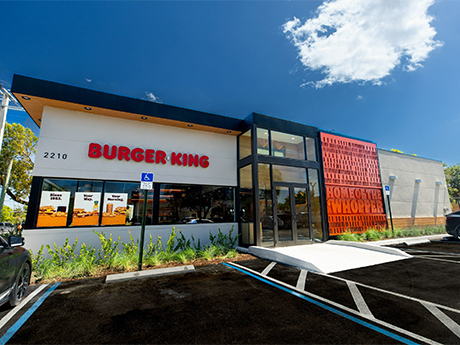MIAMI — Burger King plans to invest $300 million to modernize 1,100 U.S. restaurants by 2028, according to parent company Restaurant Brands International Inc. (NYSE: QSR). Each restaurant will be renovated in a new layout, called Sizzle, that emphasizes flexibility as well as the digital, pick-up and drive-thru experiences.
In addition to the planned renovations, the investment will also cover cash incentives for top-performing operators.
“We are committed to giving our guests the very best experience in all our restaurants and that includes a modern, exciting restaurant image and digital experience that exceeds their expectations,” says Tom Curtis, president of Burger King North America. “We are working in close partnership with our franchisees to transform our restaurant footprint across the country and reclaim our flame as a leader in the QSR [quick-service restaurant] industry.”
The newly announced initiative, dubbed Royal Reset 2.0, is a continuation of its existing Royal Reset program announced in 2022 that included a $250 million investment in overhauling the physical real estate, tech and kitchen equipment at thousands of Burger King locations. The first Royal Reset plan was part of a $400 million campaign, called Fuel the Flame, that also included $150 million in digital and media advertising.
Burger King has experienced strong sales in the 100 Royal Reset remodels that have been completed and reopened for at least six months.
The latest move also comes a few months after Burger King announced a $500 million renovation plan for more than 600 restaurants in connection with the Miami-based chain’s $1 billion acquisition of its largest franchisee, Carrols Restaurant Group.
As a result of the Royal Reset programs and planned Carrols remodels, which cumulatively total $950 million, Burger King says it will be able to modernize 85 to 90 percent of its U.S. restaurants by 2028. The brand does not expect to deploy any additional capital toward co-investment remodel programs once these programs are complete.
Burger King operates more than 19,000 locations in more than 100 countries and U.S. territories. The company’s first restaurant, dubbed Insta-Burger King, opened inn 1953 in Jacksonville. The next year, the restaurant chain was acquired by Miami-based investors who also renamed the brand as Burger King. Today, nearly all Burger King restaurants are owned and operated by independent franchisees, many of which are family-owned.
Restaurant Brands International is the parent company overseeing more than 30,000 restaurants in more than 120 countries and territories. The Toronto-based company owns four of the world’s largest fast-casual and QSR brands: Tim Hortons, Burger King, Popeyes and Firehouse Subs.
The company’s stock price closed on Monday, April 29 at $73.84 per share, up from $70.60 a year ago.
— John Nelson


